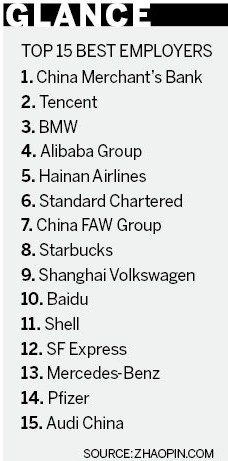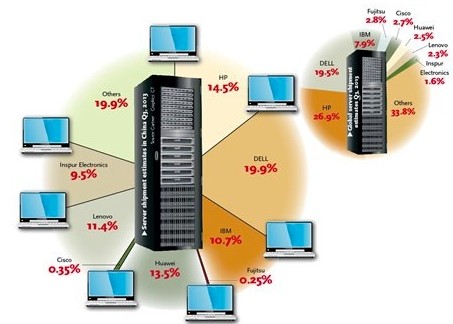Ideal job offers more than money
January 27th, 2014

What makes an ideal employer for white-collar employees has changed over the years, a report found.
The factors in this changing perception are not all strictly work-related as inflation, general welfare and high property prices also play a role, the report jointly released by Zhaopin.com and Beijing University's Institute of Social Science Survey showed.
The annual report was published on Dec 13, together with a list of what are considered to be the top 30 best employers in China.
The survey conducted interviews in 2,132 companies in 17 industries, mostly in first- and second-tier cities.
"Compared with two years ago, white-collar workers are not just focused on high salaries but want more of a welfare package," said Zhu Hongyan, a senior career consultant at Zhaopin.com, one of the country's biggest job-hunting websites.
"They also care more about whether they can get respect, and enjoy good working relationships in the office, rather than simply promotion opportunities, as in the past," she added.
Xu Jianhong, 25, graduated from a top university in Nanjing in 2011 and began work at a leading consulting firm in Shanghai.
"My salary is considered high compared to my classmates, and that's the main reason I chose the job," he said. "But now I find it not worthwhile as the working hours are too long, and there is no work-life balance. I don't have a hukou (household registration) so I cannot enjoy the benefits that come with it."
Xu said that in a year or two, he will consider changing jobs to a more stable company, preferably a State-owned company (SOE) as they have better welfare packages.
"I don't regret the choice I made as I acquired a great many job skills and the relationships within the company are good, with no hierarchy, no bureaucracy. We can discuss issues with the big boss anytime," he said, wondering whether any new job would offer such a pleasant environment.
"If I change and work in an SOE, I worry that the environment within the company will be different and I will have a hard time getting used to the hidden rules."
Xu's opinion was echoed by many of his peers.
Liang Lin, 29, graduated with a master's degree in business from a top university. She has changed jobs three times over the past five years, and said her preference has changed as well.
"The first job I had was with a US insurance company," she said. "It was good pay but long hours."
She wanted a better work-life balance, where she has time to do the things she wants to do.
Now she is representing her company, which is an SOE, as it opens a joint venture with a local company in Shanghai.
"I have more free time, and I get a good social welfare package," she said. "I can do things I enjoy."
Zhu, the career consultant, explained that this change is in line with the theory of Maslow's Hierarchy of Needs. Maslow was a US psychologist who published a well-known paper in 1943 that prioritized human needs.
"This shows that an employee needs develop from basic physiological to higher psychological needs, as the theory explained," she said. "Maslow describes this level as the desire to accomplish everything that one can, to become the most that one can be."
Zhu also explained that SOEs, as they have a market monopoly in certain industries, can provide employees with better welfare packages, including hukou, medical care, children's education and perhaps housing. That complete package, which is hard to get even if a worker has a high salary, is more attractive nowadays.
"As a fresh graduate, I believed that money talked, but now I realize the importance of work-life balance, and the process of self-actualization. To do what you want to do and be allowed to do so is truly a blessing," said Li Xinyuan, who has worked with a US law firm since 2010 after graduating with a law degree from an Ivy-league university in the US.
Her monthly income is double that of her peers who work in SOEs but she said she feels that the money alone is not reward enough.
Li is thinking of getting a PhD degree and then teaching.
"That is more meaningful to me," she said.
Wechat's 'Licaitong' attracts 800m yuan, challenging Yu'E Bao
January 26th, 2014
Tencent's Wechat users transferred more than 800 million yuan to the app's wealth management platform, "Licaitong" on Jan 22. Provided to China Daily
Tencent's Wechat users transferred more than 800 million yuan to the app's wealth management platform, "Licaitong" on Jan 22, the day it was launched, Morning Express reported Thursday.
The newcomer "Licaitong", which literally means a wealth management facility, serves as a spear for Internet giant Tencent, which wants to do full justice to its popular instant messaging smartphone app, Wechat, and gain a foothold in China's increasingly competitive Internet finance sector.
"Yu'E Bao", the first such wealth management tool, received 350 million yuan on June 13, 2013, the day it was rolled out by e-commerce giant Alibaba's payment platform Alipay. Search engine Baidu's wealth management product "Baifa" ushered in one billion yuan on its launch day in October last year, due to the claimed eight percent annualized return rate.
The 7-day annualized return rate of "Licaitong" was 7.5290 percent on Jan 23, while the return rate of "Yu'E Bao" was 6.4859 percent, according to Morning Express.
Full steam ahead for Shanghai Disney in 2015
January 24th, 2014
Visitors take photos of Mickey and Minnie Mouse at the exhibition commemorating the Walt Disney Company's 90th anniversary in Zhengda Square in Shanghai on Dec 18, 2013. Provided to China Daily
Shanghai Disney Resort will have completed operational plans this year for traffic and safety, as well as coping with a flock of visitors ahead of the resort's opening at the end of 2015.
"We'll make plans taking into consideration the particulars of the domestic market based on the experience of holding the 2010 Shanghai World Expo," said Fan Xiping, chairman of Disney's Chinese joint venture partner in Shanghai Disney Resort, Shanghai Shendi Group.
"For example, large visitor flows are expected during the National Day holiday and the weekend after the national college entrance exam," Fan said on Wednesday.
"We'll be committed to ensuring a safe and orderly operation, especially when there's a huge visitor flow or bad weather, to keep the best service standards and create an immersive and unforgettable experience for guests," said Fan.
Construction of six themed zones in the resort as well as two Disney-themed hotels and retail, dining and entertainment districts are also on track in the 3.9-square kilometer resort in Pudong.
Construction of a "mountain", an attraction in the resort's Magic Kingdom-style theme park, started last week. The mountain will be the second highest structure at Shanghai Disney Resort after the Enchanted Storybook Castle. On completion, it will stand as the highest mountain in Pudong, according to the public communications department of Shanghai Disney Resort.
"The main projects in Disneyland will be completed this year and people will see the outlines of the castles and themed lands," Fan said.
They are also promoting the development of surrounding projects in the Shanghai International Tourism and Resorts Zone, which will include an outlet complex and ecological gardens.
Some political advisers urged Shanghai to introduce more world-class cultural and entertainment projects to build the zone into an international attraction.
"The Shanghai tourism department may talk to more first-class projects that have global recognition, who I believe will be interested and confident of the prospects of the zone in Shanghai, to build the city into a destination for travelers from around the world," said Guo Guangchang, a member of the Shanghai Committee of the Chinese People's Political Consultative Conference and chairman of Fosun International, which is involved in industrial operations and asset management.
These projects should be complementary to Disneyland so that visitors will have rich and novel experiences, he said.
Chen Chao, another committee member, said prestigious cultural influence is an important factor when tourists look for a destination.
Chinese tertiary industry soars in 2013
January 23rd, 2014Economic numbers from China's tertiary industries have exceeded those of the country's secondary industries for the first time in 30 years.
Tertiary industries include things like the service sector.
The new numbers suggest a change in direction for the Chinese economy, including a stronger focus on enforcement in tertiary sectors.
NBS Commissioner Ma Jiantang says those sectors combined to make up more than 46% of China's economy last year.
NBS spokesperson Sheng Laiyun says researchers are now trying to figure out whether the emergence of the tertiary market last year is a trend, or just a blip.
He states that he believes the change is the result of years of policy changes and adjustments, affecting business structure and development.
Chen Fengying, director of the Institute of World Economic Studies, says changes in the Chinese economy fit nicely with current global trends.
"The world economy has experienced a downturn in the past few years, China has seen a decline in its exports in the past two years. China cannot rely on exports alone; it must stimulate domestic consumption as well. The rise in its tertiary sectors is a success for the central government and its policies regarding economic transformation."
Lu Zhengwei, chief economist at Industrial Bank, says e-commerce is one result of the transformation in economic structure.
"New shopping habits and powers have emerged, such as the young generations' shopping online; 2013 has seen a significant rise in e-commerce. This is different from the trend in commodity sales and it shows the power the young generation has in e-commerce."
As a manufacturing power traditionally, China's secondary industry faces new challenges.
Chen Fengying says that China stills needs it to create more jobs and boost the economy.
Career development main reason for job-hopping
January 22nd, 2014Career development and more room for personal growth are the primary reasons that Chinese change their jobs, global recruitment consultancy Robert Walters reported on Tuesday.
Eighty-one percent of the 400 Chinese respondents surveyed said they will change jobs in 2014. Of those, 47.1 percent said the reason was to seek more room for personal growth, while 20.2 percent of them sought promotions in new companies, according to the Robert Walters 2014 Global Salary Survey.
Salary increase, though not weighing as much now as in the past, is still a significant driver of job-hopping. People who stay in their current position can expect a salary increase of between 8 and 10 percent. But for those who change jobs, salaries can jump 15 to 25 percent.
Arthur Wang, managing director of Robert Walters China, said employers should help their employees to map out a clear career path. "If promises are not kept, employees will definitely leave the company," he said.
Lenovo said to be eyeing IBM’s server unit
January 22nd, 2014
China's Lenovo Group, the world's largest personal computer vendor by shipment, said Tuesday that the company was in preliminary talks about a potential acquisition, which some insiders said would be International Business Machines Corp (IBM)'s server division.
A filing posted on the Hong Kong Stock Exchange on Tuesday showed that Yang Yuanqing, Lenovo's chairman, refused to disclose detailed information of the third party as well as the deal.
"The company has not entered into any definitive agreement in relation to the potential acquisition," Yang said.
Unnamed sources familiar with this matter was quoted by Reuters as saying that Lenovo has restarted negotiations of purchasing IBM's low-end (X86) server business after the two failed to reach a deal in early 2013 due to their divergence on the cost.
According to media reports in May last year, IBM expects to offer the unit for sale for between $4 billion and $6 billion while Lenovo was only willing to put in $2.5 billion.
Lenovo refused to comment on the possible acquisition when reached by the Global Times on Tuesday. IBM did not reply to the Global Times' e-mail inquiry by press time.
In pursuit of high profits, IBM is very likely to sell its lower-end server operation at a satisfactory price, largely because this segment has become increasingly mature, leaving little room for robust growth, Cao Yujie, director of consultants for Beijing-based IT market research agency CCW Research, told the Global Times Tuesday.
According to Morgan Stanley's estimates as quoted by media reports Monday, IBM's X86 server unit generated around $4.9 billion of the total $15.4 billion in its overall server business in 2012.
Data from the US IT research firm Gartner released in December indicated that in the third quarter of 2013, worldwide X86 servers saw low levels of growth at 2.1 percent year-on-year in shipments, with revenue rising 4.4 percent. The whole server revenue declined 2.1 percent year-on-year in the third quarter.
Despite the low margin, an acquisition of a server business run by market veterans like IBM would significantly boost Lenovo's market share and enable it to stand out from domestic competitors as well as better compete with foreign peers, said Cao.
Lenovo bought IBM's Thinkpad PC unit in 2005 for $1.75 billion, which helped it leap to the top of the worldwide PC market.
In the fourth quarter of 2013, the company accounted for 18.1 percent of worldwide PC shipments, ranking first, according to Gartner.
The company has already dipped its toe into the server market in an attempt to diversify its product range beyond PCs.
In early January 2013, it set up a joint venture with the US computer storage service provider EMC Corp to further develop its X86 server business.
However, it does not perform well in this sector due to its lack of advanced technology and brand recognition, Zhang Yi, CEO of Shenzhen-based Internet research firm iiMedia Research, told the Global Times Tuesday.
According to Gartner, Lenovo ranked seventh with a market share of 2.3 percent by worldwide server shipments in the third quarter of 2013, while HP topped the rankings with 26.9 percent and IBM was in third with 7.9 percent.
Zhang believed that Lenovo could win more customers if the acquisition of IBM's low-end server unit can be finalized successfully.
But he was concerned that the deal may invite scrutiny from US authorities, as servers pose a more important security issue than PCs and handsets due to their being used by governments and enterprises for data storage and processing.
In October 2012, Huawei and ZTE, China's two leading telecommunications equipment makers, faced charges by a US congressional panel of posing a national security threat to the US.